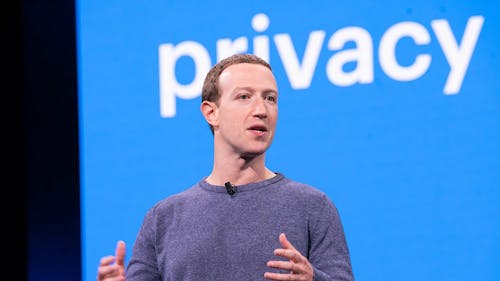Why we need to care that tech companies are stealing our data

We give away pieces of ourselves, constantly and casually. We scroll right past the terms and conditions. We don’t think twice about giving social media websites our personal information, and all the while, they're collecting information about our likes and dislikes.
We can’t help but notice how specific advertisements are to our interests and then chastise ourselves for buying something that even our computer knows we want. We don't realize that when a company shares our data, we become the currency.
A lot of people are familiar with the Cambridge Analytica scandal, but here’s a quick refresher: In 2018, it was discovered that Cambridge Analytica, a data firm principally owned by the Right-wing donor Robert Mercer, used data obtained improperly from Facebook to build voter profiles that would aid former President Donald J. Trump’s re-election campaign.
But how could your Facebook likes be used to predict your political views? What if the things that you are interested in aren’t related to politics at all?
To see this in action, let's look at the sample model with Kim Kardashian. Say you like her posts, so as expected, you’ll see more of her content on your feed.
But what isn’t so evident is the way researchers had figured out how to tie your interest in the reality TV star to certain personality traits.
In fact, researchers can use your interest in Kardashian to deduce that you're more likely to be extroverted, conscientious and open-minded, according to an article from The New York Times. When combined with the other pieces of data that indicate your interests (what else you have liked), they can put together a fairly complete picture of you and what you like. Scary, right?
Researchers predict that these algorithms can more accurately express the specificities of your political preferences than your family and friends. And this capability of technology to know us and monitor that information is exactly what motivated Cambridge Analytica to collect data from more than 50 million Facebook users without their consent.
This stolen data was then used to build behavioral models in order to target specific voters, a means to an end to achieve Cambridge Analytica’s real goal of manipulating voters and having the power to sway elections.
Lawmakers demanded that Mark Zuckerberg (who is Facebook’s chief executive) testify before Congress. While he was questioned in both the Senate and the House, Zuckerberg suggested that he could be open to regulation during his session in the House. There was consensus that social media technology and its potential for abuse had grown out of the government's control.
Zuckerberg’s suggestion of regulation fell flat because neither he nor the lawmakers knew the ideal way to regulate the use of this data. Technology has outpaced government, and the laws still need to catch up to the ever shifting technological landscape that we find ourselves embroiled in.
And it’s not just Facebook. “For every article about Facebook’s creepy stalker behavior, thousands of other companies are breathing a collective sigh of relief that it’s Facebook and not them in the spotlight,” CNN’s Bruce Schneier said.
We don’t lie to our search engines, and our cell phones are some of the most intimate surveillance devices ever invented. There are thousands of other companies that monitor and manipulate us for profit. Shoshana Zuboff, Harvard professor and a leader in the subject, calls it “surveillance capitalism.”
Companies collect our data to use it against us. The service is “free” because we pay the ultimate price later — when we're psychologically manipulated into buying a product or voting for a particular political candidate.
But not all hope is lost. Pushing this issue out of the shadows can encourage increased regulation. If we create a demand for more ethical data collection and reduced spying efforts, we can reclaim our privacy.
Our data is out there already, but we have the political and economic power as consumers to make sure that our information isn't abused. After all, these are precious details of our lives that can be used to either make or break society as we know it — we must, and should, care.



